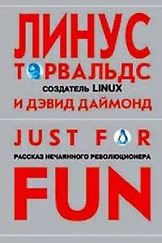I approve or disapprove of their work, but mostly I let things happen naturally. If two people are maintaining similar kinds of things, I accept both of them to see which gets used. Sometimes they both get used but wind up taking different paths. Once, there was intense competition between two people who insisted on sending patches that fought each other's patches. I refused to accept patches from either, until one of the developers lost interest. That's how King Solomon would have handled things if he ran a preschool.
Benevolent dictator? No, I'm just lazy. I try to manage by not making decisions and letting things occur naturally. That's when you get the best results.
My approach made headlines.
But the irony here is that while my Linux management style, such as it is, was earning high marks in the press, I was an undeniable failure during my brief stint as a manager at Transmeta. At one point, it was decided that I should manage a team of developers. I flopped. As anyone who has ventured into my junk heap of an office knows, I'm totally disorganized. I had trouble managing the weekly progress meetings, the performance reviews, the action items. After three months it became obvious that my management style wasn't doing anything to help Transmeta, despite the praise I was getting from journalists for the way I was running Linux.
Meanwhile, the press kept pounding away at another issue: fragmentation. Those who have followed the rocky, unhappy history of Unix know about the endless bickering between Unix vendors. The question came up all the time in 1998: Would history repeat itself in the world of Linux? My answer was always that while there undoubtedly is bickering among Linux vendors, it can't lead to the fragmentation that has kept Unix a perennial almost-been. The problem with Unix is that competing vendors wasted years implementing similar features, simply because they didn't have access to the same source base. Developing the same features independently not only cost Unix years but it also led to bloody infighting. Sure, I would tell the press, Linux vendors don't host regularly scheduled Love-Ins. But there is and will continue to be less fragmentation inside the Linux community than in the Unix community, because even Linux vendors who are not friendly can see the same source base and can reuse each other's work. The source code is a repository from which anyone can draw.
The more journalists started grasping such concepts, the more I liked meeting them. (Unlike the journalists I remember from my youth in Helsinki, most of them in the United States in the 1990s were sober.) I particularly enjoyed the opportunity to debate with them.
But speaking was another matter entirely. I'm not what you'd call a natural performer. Remember: I'm the fellow who barely left his bedroom throughout his childhood. I never was very good at even writing speeches, so I always waited until the night before an event to prepare.
Somehow, that didn't seem to matter. Typically, I would step out to the podium and people would rise to their feet and applaud even before I opened my mouth. I don't want to sound unappreciative, but I've always found that to be an embarrassing situation. Anything you say sounds wrong, even my standard, "Thanks, Now Please Sit Down." I'm open to suggestions.
But not all the calls were from journalists or conference organizers. One night I was sitting at home with Tove. We were reading to the girls. The phone rang.
I answered: "Torvalds."
"Uh, Is this the Linux guy?"
"Yes."
Two seconds of silence. Click.
Another night a fellow from Las Vegas phoned me at home, trying to get me to sign on with some Linux T-shirt business.
The obvious solution would have been to get an unlisted phone number. I didn't bother to do that when we first moved to California because it was more expensive than having a listed number. I've since learned the price you pay for being so frugal, and am now unlisted. Once, before I got de-listed, David misplaced my home number and phoned directory assistance. He asked for my number, and the operator who provided it said with great astonishment, "He's listed? With all his millions?"
But no, there weren't millions. Millions of Linux users, sure. Not millions of dollars for Linus.
And that was perfectly fine.
Most days I wake up thinking I'm the luckiest bastard alive. I don't remember if Wednesday, August 11, 1999 was one of those days, but it should have been.
It was the second day of the Linux World convention and trade show which had been taking place at the San Jose Convention Center. Dirk Hohndel, who is CEO of SuSE and traveled from Germany for the trade show, had spent the night on the guest bed in our family room. I've known him for years. He's one of the old XFree86 people, and is on the graphics side of Linux. He's also Daniela's godfather. I woke up, made cappuccino for Tove and Dirk, read everything in the San Jose Mercury News except the sports pages and the classified ads -- like I always do -- and then we piled into the Toyota Rav4 for the ten-mile trip to downtown San Jose.
I remember shaking a lot of hands.
This was the day that Red Hat would be going public. The company had years earlier given me stock options, and had only recently sent me some paperwork that I never bothered to look at. It sat somewhere in a stack of papers near my computer. I remember I really wanted Red Hat to do well. It wasn't so much a matter of being excited about the options -- I didn't quite realize what they meant. I was extremely jazzed for another reason. In many respects, the IPO's success would be a validation of Linux. So I was a bit nervous that morning, but I wasn't the only one. The market had been doing poorly for weeks, and people wondered whether or not Red Hat would even pull off its IPO.
The "liquidity event" did, in fact, happen. We got word on the conference floor that Red Hat's initial public offering came in at $15. Or was it $18? I don't remember. The important thing was that it ended the first day of trading at $35. Nothing record-breaking, but it was okay.
I remember driving home with Tove and Dirk in the car, first feeling relieved. Then, when I thought about the money, growing excited. Only when we were stuck in Northbound traffic on Highway 101 did it strike me that in one day I had gone from basically zero to half a million dollars. My heart started beating faster. It was elation tempered with disbelief.
I was clueless about stock and decided I needed to find out what to do next. So I phoned Larry Augustin, VA Linux's CEO. I told him he was the only person I knew who had a clue about how stock works. My exact words: "Do you have like a stockbroker or somebody that you trust because I don't want to go on eBay?"
Red Hat had given me options -- not an outright grant of stock. I didn't know what to do about exercising them. I knew there might be a lockup period but I didn't know if it applied to me, and I hadn't thought about the tax consequences. Larry, who is good at this sort of thing and who knows a lot of people, got me in touch with this guy at Lehman Brothers, who shouldn't have been handling me at all because I wasn't a big customer. He promised to find out what I should do. Meanwhile, two days after the IPO, I got an email from someone in Red Hat's Human Resources Department, or their lawyer, in which they mentioned something about the stock having split before the IPO. I knew nothing about it. So I tracked down the manila envelope containing all the stock option paperwork I had never bothered to read, and there it was, in plain (for legalese) English: My options had magically doubled.
My half-million dollars was actually a million dollars!
Regardless of the image that has caught on in the press, of me as a selfless geek-for-the-masses living under a vow of poverty, I was, frankly, delirious.
Читать дальше












